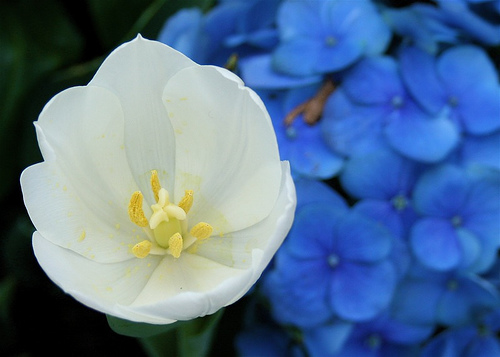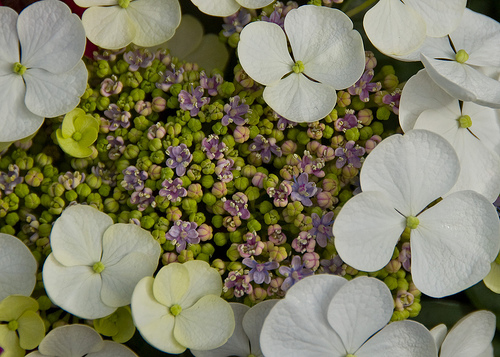Turn Envy into Inspiration
 Saturday, August 15, 2009 at 3:21PM
Saturday, August 15, 2009 at 3:21PM 
Have you heard?
That e-course filled up in a day! He got a book deal! The online sale sold out in an hour! She's making enough money to support herself! He was invited to teach! She's getting national media coverage!
Gossip, gossip; murmur, murmur.
Here's the deal: The online community (and the rest of the world, for that matter) is made up of two kinds of people: the doers -- the movers and shakers -- who get all the attention and do all the cool projects; and the wannabes, who wish they could be like the doers.
Whoa. Do I really believe that? Not exactly. But here's what I do know to be true: There's an epidemic of envy in the online community. I'm not pointing fingers or throwing stones in a glass house here. I have been part of the epidemic. I speak of what I know.
You know who I mean when I say "the doers," right? Those folks who frolic among the clouds, slide down rainbows, and sleep on lavender scented moonbeams while money and high quality organic chocolate pour into their bank accounts. They're smart and beautiful; well connected and well loved; prolific and profitable. We each have our own private list of such people. Maybe it's filled with artists, writers, and photographers. Or maybe it includes entrepreneurs, tech gurus, and public speakers. Or food bloggers, craft bloggers, and mommy bloggers.
The online world is huge, but every list is extremely specific, isn't it? My list may be completely different from yours, but a lot of the accompanying thoughts and emotions are the same. The people on these lists are the ones we blog stalk, obsess over, and analyze. We feel like a loser when they announce yet another success. We get snarky and think, "Well, must be nice!" Then we feel uplifted and affirmed when they respond to one of our comments or emails. We're their biggest fans and their biggest critics. We've become the TMZ of blog celebrities, the British tabloids for online royalty.
Envy brings out the worst in us because we believe that envy is a "bad" emotion. As kids we're taught to share and to play nice. We know we're supposed to be generous and happy for others -- this is woven into the ethical fabric of our social consciousness. So when we feel envious, we often feel guilty and embarrassed. And from our shame can come a callousness designed to cover up the fact that we're feeling an emotion we've been taught is wrong.
We turn envy into anger because anger gives us a feeling of power.
But here's the thing: We envy what we covet. We covet what we love. And we love -- are you ready? here it comes! -- we love what we're meant for.
I'm going to repeat that, in a boldfaced, bulleted list kind of way, in case you're like me and tend to skim blog posts too quickly:
- We envy what we covet.
- We covet what we love.
- We love what we're meant for.
Jealousy is a compass. It points us to our true north, to what we value and long for the most. I learned this from Julia Cameron's The Artist's Way. (I know, I know. This book is quoted all the time in certain creative circles. But for good reason, I say.)
We need to stop reacting to jealousy with guilt and the subsequent mean-spiritedness. Now here's where I'm going to get all Zen on you. The next time someone on your list announces a fabulous new project, success, or accolade, just notice your jealously. Sit with it. Get curious about it (as this astute life coach would say). Look at it with a beginner's mind and wonder about it. What does it mean? Why do you feel this way?
What is it about that other person's situation that you want? Is it the recognition? The creative freedom? The money? Don't judge this. Just admit to yourself why you envy that other person. When you know the reasons for your envy, you'll see what you covet. When you see what you covet, you can discover what you love. And when you've discovered what you love, you'll know what you are meant for.
Then you can turn your envy into inspiration. (Which is sort of like turning that frown upside down, but not so rhyme-y.)
In other words, unpacking our envy allows us to target our motivating factors. Then, instead of feeling sorry for ourselves about someone else's good fortune, we can start moving in the direction of our own. If you're a good-hearted person with a desire to live fully and authentically, I promise that this will feel so much better than kvetching about someone else's success.
And here's the shocking secret I've recently learned: Those doers -- the people we think have all their shit together, those amazingly creative and popular peeps -- they often feel like wannabes, too. They struggle and they fail and they feel lonely sometimes. Just like the rest of us wannabes!
Wait? Could it be? We're all wannabes? Maybe.
Or maybe we're all doers in different stages of doing.
I once read that experiencing a beautiful piece of art won't make the true artist jealous; rather, it will inspire her in her own art. I took that as truth for awhile, but it depressed and discouraged me because sometimes I see amazing things and I do feel jealous. Therefore, I came to believe that I wasn't a true artist.
But that axiom is an oversimplification of things. Envy is a naturally occurring reaction, but it doesn't have to turn ugly. We can choose whether or not to turn our envy into inspiration. Like all worthwhile commitments, it's one I have to choose again and again.
So, to sum it all up in a nicely alliterative, yet somewhat smarmy way: Inspiration can inoculate us against the envy epidemic.
What do you think?



Reader Comments (42)
I honestly envy your writing chops -- because I do want to be a better writer.
You are my inspiration!
Thanks for reminding all of us how to move through it. I just subscribed to your blog, chica! You're the kind of soul I want to hang with.
what truth rings in those words!
love your thoughts. thank you.
So beautifully said!
and such an important topic.
One that we all have experienced at so many times in our lives!
Thank you for bringing it out into the light.
and for offering up such an empowering reframe.
So filled up by this,
andrea
I don't covet what I love, and I don't think most people do, either. Unless I misunderstand your exact meaning. Coveting is wanting what someone else has because they have it and you don't. It's like a child vs. child scenario. Child 1 has Toy A, Child 2 has Toy B. Everyone is happy until Child 2 picks up Toy C. Then Child 1 sees that and covets Toy C, simply because he/she doesn't have it and the other child does.
On the clarification... what is it that we are supposed to be inspired to do or become once we take a step back to examine our jealousy? Is it to re-engage in our own creativity and ambition, SO THAT we can then obtain what it is we originally coveted? Or is it just to re-aim our emotional knee-jerk reaction and center ourselves again to our truest purpose and highest meaning?
Hope these questions are allowed to be discussed here! :-) Love you, Jenn-eye.
I used the word "covet" to mean "to wish for earnestly," which is the first definition on Merriam-Webster's website. You're right, the word "covet" can also be used (and often is used) in the way you described, " to desire (what belongs to another) inordinately or culpably" (which is the second definition listed on m-w.com). In this case, though, I'm not talking about wanting something only because someone else has it, as in your scenario with the kids and the toys.
On the clarification of what to do after examining our jealousy, I think the next steps are up to the individual. That said, I do think that both of the things you mention often take place (for me, at least): I re-aim my emotional knee-jerk reaction and center myself again to my truest purpose and highest meaning. I also re-engage in my own creativity and ambitions so that I can work toward my desires and goals in this realm of my life. For instance, instead of feeling jealous, angry, or disappointed when a friend announces her book deal, I can feel joy for her and refocus on my own writing, both for the sake of the writing itself and with the goal of my own book in mind. As I said in the original post, "...unpacking our envy allows us to target our motivating factors. Then, instead of feeling sorry for ourselves about someone else's good fortune, we can start moving in the direction of our own."
xo